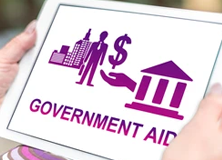Cash Assistance Programs in Michigan
There are many people in need of cash assistance all over America. These people cannot fund their needs and require external aid. As of 2021, the poverty rate in America was 37.9 million, about 11.6% of the population. The numbers making up this average were higher in some states than others.
In Michigan, the poverty rate has consistently decreased since it peaked at 17.4% in 2011. By 2021, this number dropped to 12.6% of the state’s population. While this is progress, many households are still above the poverty threshold but require assistance to meet their basic needs. In fact, one in every four Michigan households fit into that category.
Government Cash Assistance Programs in Michigan
Many programs have been established over the years to provide monetary support to individuals and households in Michigan needing cash assistance. People who receive cash assistance can also receive aid in the form of jobs, education, and training to help them learn job skills and possibly gain employment.
The Michigan Department of Health and Human Services (MDHHS) decides on Family Cash Assistance (FIP) recipients. They manage public assistance and service programs in over 100 county offices in the state. To qualify for any cash assistance program in Michigan, an applicant must meet the following criteria:
- Be a US citizen or qualified legal immigrant.
- Live in Michigan.
- Must not be receiving cash assistance from other states.
- Cash asset limit of $15,000 and property asset limit of $200,000.
Michigan Family Independence Program
The Michigan Family Independence Program provides temporary cash assistance to families to aid them in covering their living expenses. Adult applicants of the FIP program are also assigned to another program, called PATH (Partnership, Accountability, Training, Hope) to help them get a job and/or develop the skills for one. The PATH program has an assessment period of 21 days for applicants to become familiar with limitations to finding employment and how to overcome them. Without the 21-day assessment, you cannot progress with your FIP application.
Who is Eligible for the Michigan Family Independence Program?
The FIP is open to families with children and pregnant women needing financial aid. To qualify, you must fulfill the general criteria from above for cash assistance in Michigan as well as any of the following:
- Be pregnant
- Have a child of 18 years or below.
- Be 18 years or less and the primary provider for the family.
More on the PATH Program
As mentioned earlier, adults applying to the FIP program must follow the PATH program. This is a work participation program on which receiving FIP cash assistance is dependent. If you are disabled or caring for a disabled person, you can apply to be exempt from participating in the PATH program.
You are obligated to abide by the following work rules once you become an applicant or recipient of the FIP cash assistance:
- Complete the Job and Self-Sufficiency survey.
- Develop a Family Self-Sufficiency Plan. This plan should highlight the steps you will take to get cash assistance.
As an applicant, failure to complete these steps without a valid reason can cause the MDHHS to deny your application. As a recipient, the MDHHS can temporarily suspend your cash assistance the first and second time you default. If you default a third time, you will be permanently unable to receive further cash assistance.
State Disability Assistance
As the name implies, the State Disability Assistance (SDA) program is for disabled adults. Eligible disabled adults or caregivers of disabled senior citizens can apply for this program to get cash assistance from the state.
Who is Eligible for SDA?
Michigan’s SDA is open to disabled people who live in a special facility or receive disability-related benefits. It is also available to people certified by MDHHS medical consultants as unable to work for at least 90 days due to physical or mental illness. You can find full eligibility details for the SDA program here.
How to Apply for Cash Assistance in Michigan
The fastest way to apply is online, either by yourself or by visiting the MDHHS office near you to be assisted by an employee using their computers. Alternatively, you can print out the application form, fill it out, and submit it at the MDHHS office.
Wherever you are applying, you will need to submit some documents to prove some of your responses to the application. These documents include the following:
- Passport
- Birth certificate
- Driver’s license
- Social Security Card
- State ID card
- Bank statement, not more than 30 days old.
- Lease or rent receipt
After submitting your application, the MDHHS will contact you to schedule a conference with you. This conference is to go over your application. Be sure to attend the meeting with your documents and ask questions on any parts of the application you don’t understand. If you can’t write or speak English, you can either enlist the help of an MDHHS interpreter or come with your interpreter.
FIP Problems and How to Resolve Them
Certain problems can hinder your success as you apply for or receive cash assistance through the FIP program. Here are the most common and how you can overcome them:
Denied Application
Sometimes, your application for FIP cash assistance could be rejected despite your best effort. If you disagree with this decision, you can request a hearing up to 90 days from the date on the notice. As you may not be familiar with the legalities of your case, it will be advantageous to you to check if you are qualified to receive legal help with this guide.
Decreased Benefits, Case Closure, or Termination
You can appeal the reduction, termination, or closure of your cash assistance benefits if you disagree with the MDHHS decision. By requesting a hearing within the first ten days of the notice date, you can even request a stay in action of the decision until the hearing is made. If deemed eligible, you may also ask for retroactive benefits if you apply for a hearing within the first 90 days of the notice date. Use the tool on their site to complete your hearing request online, and be sure to have a copy for record-keeping.
Note: Report any changes to your household size, income, and assets within ten days to keep MDHHS from reducing or suspending your benefits. You can do so online or by calling the MI Bridges Support line: 888-642-7434
Frequently Asked Questions
There are many questions you may have about the Michigan state cash assistance program. We will be answering the most commonly asked ones here.
How Long Does Application Take?
The application for the Family Independence Program takes about 45 days to complete. You can either apply online or in person at your local MDHHS office.�
How Do I Receive My Cash Assistance?
If you apply and are selected to become a recipient, you will receive a Michigan Bridge Card. Recipients of the cash assistance programs can use this card to buy particular food items and withdraw cash at ATMs. You cannot use the card to purchase alcohol, tobacco, or other non-food items, nor can you use the card at businesses like spas and tattoo shops.
How Long Can I Receive Cash Assistance in Michigan?
Federal and state laws vary on how long one can receive cash assistance from FIP. While federal laws allow each recipient 60 months of lifetime cash assistance, state laws allow 48 months of lifetime cash assistance.
Other Governmental Provisions
There are other programs in Michigan State aside from cash assistance that aim to help low-income families access basic needs.
Food Assistance Program (FAP)
The FAP exists to enable low-income individuals more ability to purchase food. The federal government funds it, while the federal and state government share the administrative cost. If you live alone, your bank balance must be below $2001 to qualify for this program; or $3251 for individuals living with others (children, people with disability, or senior citizens).
Applicants for the FAP still qualify to apply to other federal, state, or local programs for low-income families.
Medical Assistance
Medical assistance, also called Medicaid, is a state and federal-funded program that provides healthcare for members of low-income households with no or inadequate medical insurance. The State’s Department of Health and Human Services, DHS, administers the program. Eligibility for this program is determined after you apply using your age, income, and other information. Find the DHS county office near you to apply for Medicaid in Michigan.
State Emergency Relief (SER)
This program is for low-income families that can usually meet their needs but can’t because of an emergency. These emergencies could be:
- Burial of a loved one
- Relocation
- Home repairs
- Heat and utility repairs
Financial difficulties are a source of concern for many people around the world. Fortunately, programs are available in Michigan to assist residents through the worst. If you or someone you know require financial aid, make sure to check and apply for those you are eligible for. You can find more programs for low-income families and individuals in Michigan here.

 2022-07-07
2022-07-07
 2022-10-04
2022-10-04